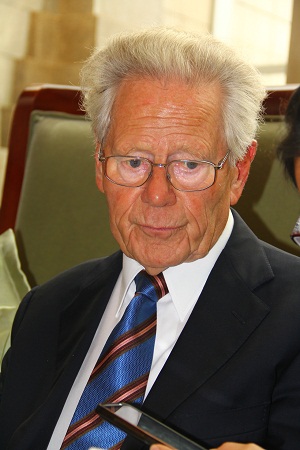Peking University, Nov.2, 2012: Hans Küng, a Professor Emeritus from the University of Tübingen as well as the Founder and President of the Global Ethic Foundation delivered his keynote speech titled Harmony at Diaoyutai State Guest House. In his speech, he addressed the implication of “harmony” in current Chinese society from the perspective of world ethics.

The 84-year-old professor highlighted the aim of his speech:to provide “New Thinking in a New Reality” right after he started. The crucial question would be “What harmony is desirable, what harmony will be good for China?”
In today’s China, the former optimism among Chinese has disappeared because of the increasingly high living expenses, the threat of unemployment, the migration to the urban centers, etc. Premier Wen’s warning in Qiushi about the important challenge to fight corruption so as to eliminate the biggest danger to a political party in power is no exaggeration, Prof. Küng explained.
Faced with such harsh reality, we may have to resort to traditional Chinese ethics, including Confucian, Buddhist and Taoist ethic ,as a reaction to the potential anomie. As is pointed out by Prof. Küng, various crises brought by the globalization were all created by men. Though not able to offer ready solutions for those problems, the idea of a global ethic represents an effective attempt to find such answers by offering guidelines in all areas of life.
By stating that “global ethic is never abstract artificial, global comprehensive ethos”, Prof. Küng attached great importance to finding diverse roots of global ethic in different cultures and societies. While in the most diverse regions of the world, similar norms can be extracted as the following:
–rules for the protection of life itself
–rules for protecting the relationship between men and women
–rules for the protection of property
–rules for the promotion of truth
Worth mentioning is that such ethics are not imports from western countries but manifestations of the ancient Chinese wisdom. The ideal of the “grand harmony” (da tong), promoted in ancient and current Chinese society well illustrates the search for common ground while maintaining specific characteristics of respective religions and cultures. “In particular, the two fundamental principles of the global ethic, humanity (ren) and reciprocity (shu), are age-old Chinese teachings. Someone who practices human benevolence is a true human being (renzherenye) and do not do to others what you would not want them to do to you (jisuobuyu, wushiyuren)”, said Prof. Küng.
Prof. Küng ended his speech by clarifying how such ethical values and norms relate to our daily life. The problem of “low-trust” prevailing in today’s world can be alleviated by such ethical values and trust, which is the presupposition for living together in a way fit for human beings, can be regained. Thus, the harmony and prosperity for all can realistically be pursued.
Interviewed by: Armin Reinartz, Li Chiyang, Zhang Hongyi
Reported by: Li Chiyang
Edited by: Zhang Jiang